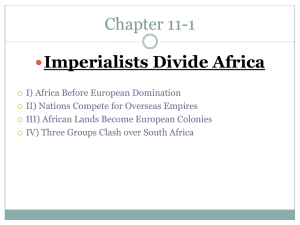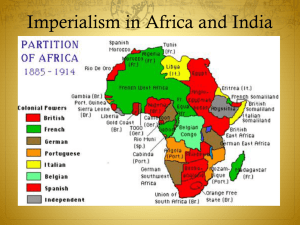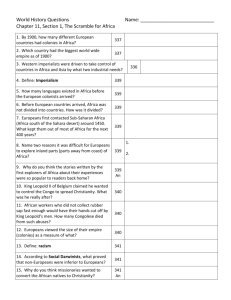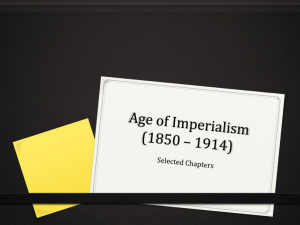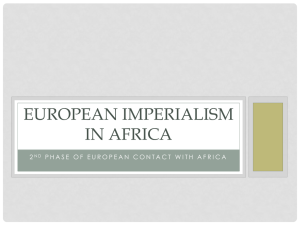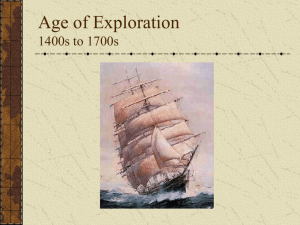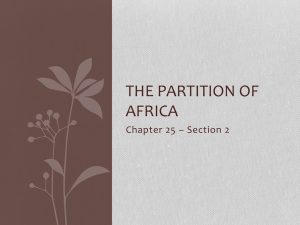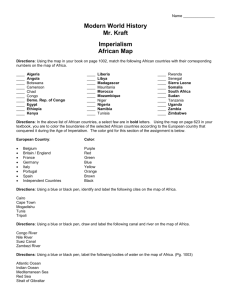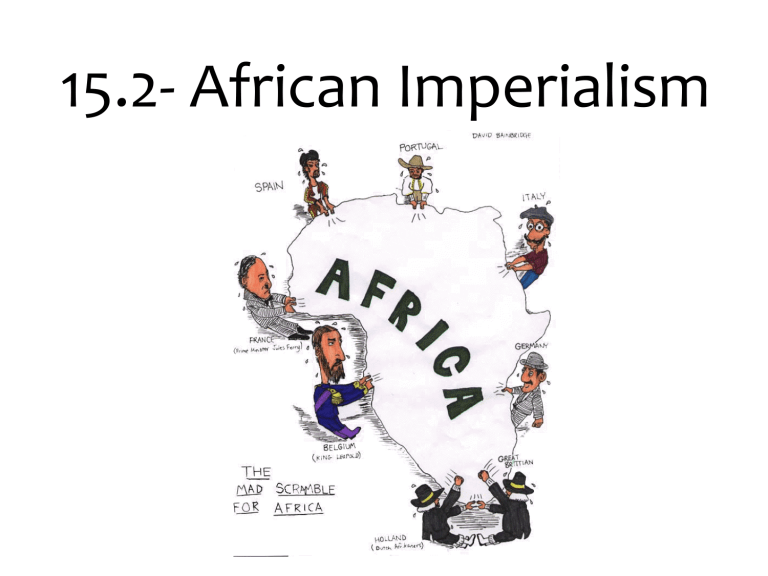
15.2- African Imperialism Africa • Before Imperialism, Africa was a very diverse land with hundreds of languages and cultures. Societies ranged from centralized government states, to village communities, to nomadic huntergatherer societies. • However, Africa was full of natural resources and raw materials, making it an ideal target for European Imperialism. North Africa Fertile lands of the Mediterranean region, and the Sahara desert. Part of the Muslim world; controlled by the Ottomans West Africa Grassy plains and forests. Predominately a Muslim area loosely ruled by the Asante kingdom East Africa Eastern Coast and Red Sea allowed successful trading empire based on selling African Slaves South Africa Southern tip including the Cape of Good Hope. Controlled by the Zulus (African Tribe under Shaka) and Boers (Dutch descendants) Sierra Leone • The British established the colony of Sierra Leone in 1787 • However, it was not meant as a imperial location for the British—it was a destination for freed slaves from Europe and the Americas. What do you notice about the location of Sierra Leone? Discovering Africa • Prior to the 1800s, most of Africa was unknown to Europeans, who only explored ports along the coast where they traded good (slaves) • Europeans had been kept out of the interior of Africa by the difficult geography, tropical diseases, and resistance by Africans. • New medical advances and river steamships allowed Europeans to begin exploring, and they started along the major rivers—Nile, Congo, Niger. Livingstone and Stanley • British doctor and missionary David Livingstone spent 30 years travelling Africa and writing about the peoples he encountered. Was strongly opposed to slavery and believed the only way to end it was to open the African interior to trade and Christianity. • In 1869, journalist Henry Stanley set off in search of Livingstone, who had not been heard from in years. He found him 2 years later, and greeted him with “Dr. Livingstone, I presume?” The Scramble Begins • In 1880, King Leopold II of Belgium hired Henry Stanley to explore the Congo and arrange trade treaties with African leaders • Leopold’s actions set in motion a race among European nations to claim African territory, with Britain, France, and Germany trying to claim the same territory as Belgium The Berlin Conference • In 1884, European powers met to discuss the division of Africa and avoid bloodshed. No Africans were invited. • They decided that a European power could not claim a part of Africa unless they had set up a government office there • The race to colonize Africa was on— European nations rushed to send officials to begin exerting control and maintaining a presence in certain areas. The Scramble for Africa Within 20 years, most of Africa was under imperial control. European powers partitioned the continent with little regard for traditional patterns of settlement or ethnic boundaries. The Butcher of the Congo • King Leopold laid personal claim to the Congo Free State- he owned as an individual, rather than Belgium as a country • He exploited the Congo in every way possible—both the natural resources (copper, rubber, ivory) and the people • Natives who did not work fast enough/meet production quotas were mutilated, beaten, or slaughtered. • It is estimated that around 10 million Congolese were killed under Leopold’s rule Ethiopia Remains Independent • Some African nations fought back against the Europeans, but only Ethiopia and Liberia successfully remained independent • Ethiopia was an ancient Christian kingdom. In the 1800s, King Menelik II modernized the country- roads, bridges, and weapons from Europe • When Italy attempted to invade in 1896, the Ethiopians successfully fought them off. South African Resistance • The British encountered resistance to their rule in South Africa from the militaristic Zulu tribe under the rule of Shaka • The Zulu won some early victories but eventually fell to the British, who had superior technology and more resources The Boer War • Britain also clashed with the Boers in South Africa after acquiring the Cape Colony from the Dutch. Many Boers, who resented British rule, migrated north and set up their own republic. • When the Boers discovered gold and diamonds in their settlement, the British wanted to claim it. This sparked a bitter war between the two that lasted from 1899 to 1902 • The British won the war and united the Boer republics with the Cape Colony into the Union of South Africa with a new constitution. This new constitution set up Apartheid- a system of strict racial segregation. Boers- Dutch descended colonists living in South Africa; also called Afrikaners Review Which is an accurate statement about the partitioning of Africa by European imperialist nations during the 1800’s? 1. new nations were based on old tribal boundaries 2. the cultural and ethnic diversity of the African people was disregarded 3. the continent was divided equally among the colonial powers 4. African unity was encouraged Take up the White Man’s burden— Send forth the best ye breed Go bind your sons to exile To serve your captives’ need; To wait, in heavy harness, On fluttered folk and wild— Your new-caught, sullen peoples, Half-devil and half-child. --Rudyard Kipling, “The White Man’s Burden” The phrase “White Man’s burden” in this excerpt refers to the 1. Negative attitude of Europeans toward peoples of the nonWestern world 2. Advantages Europeans would gain by colonizing Africa, Asia, and Latin America 3. Positive role of the Roman Catholic Church in Africa and Asia 4. Challenges non-Europeans faced when trading with the Europeans Review After 1880, European nations sought colonies in Africa primarily because the Europeans were 1. in need of land for their surplus populations 2. competing for raw materials and markets 3. determined to bring Christianity to the Moslem world 4. interested in completing their geographic knowledge of the world Review During the 18th and 19th centuries, increased contact between Europe and the continents of Africa, Asia, and South America resulted in 1. closer cultural cooperation between Europe and these continents 2. the exploitation of the labor and resources of these continents 3. a return to the political and economic systems of feudal Europe 4. preservation of the rights of the indigenous peoples Review During the 18th and 19th centuries, Europeans improved roads and bridges and built railroads in their colonies primarily to 1. provide jobs for the colonists 2. help missionaries spread Christianity 3. impress the colonists with their technological knowledge 4. obtain raw materials needed for industrialization
